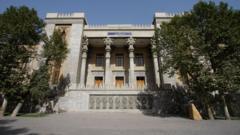Britain has summoned Iran’s ambassador after three Iranian men were charged with espionage for allegedly gathering intelligence on journalists critical of the Iranian regime. In response, Iran has demanded answers regarding the arrests, claiming they were politically motivated. The diplomatic standoff surfaces amid broader concerns over national security and state-sponsored threats.
Diplomatic Tensions Rise as UK and Iran Exchange Envoy Summons Over Spying Allegations

Diplomatic Tensions Rise as UK and Iran Exchange Envoy Summons Over Spying Allegations
The UK and Iran have intensified diplomatic tensions following the arrest of three Iranian nationals in the UK on espionage charges, prompting each country to summon the other's envoys for explanations.
In a significant escalation of diplomatic tensions, Britain and Iran have summoned each other's envoys due to allegations of espionage involving three Iranian nationals residing in the UK. The trio was arrested on May 3 and charged with spying on journalists linked to Iran International, a media organization critical of the Iranian government. According to the Iranian news agency IRNA, the UK’s charge d'affaires was summoned to provide an explanation for what Iran described as "unjustified" and "politically motivated" arrests.
The UK's Foreign Office responded by summoning the Iranian ambassador, reaffirming their commitment to national security. A spokesperson stated, “We must hold Iran accountable for its actions.” The arrests have drawn considerable attention as they may encourage discussions regarding the broader implications of foreign intelligence threats on UK soil.
Identified as Mostafa Sepahvand, 39; Farhad Javadi Manesh, 44; and Shapoor Qalehali Khani Noori, 55, all three have been living in London since they arrived in the UK between 2016 and 2022, having obtained temporary leave to remain on the basis of asylum claims. The Metropolitan Police report that the alleged spying occurred between August 2024 and February 2025.
The context of the alleged espionage is particularly sensitive, as journalists linked to Iran International face significant dangers, being labeled a terrorist organization by the Iranian regime. Home Secretary Yvette Cooper emphasized the need to enhance national security measures in light of these developments, stating, “We will not tolerate growing state threats on our soil.”
In related incidents, five other Iranian men were apprehended on the same day across several UK cities, including Swindon and Manchester, as part of a separate counter-terrorism initiative. Four of these individuals were released, while police continue to investigate one remaining suspect.
As the situation unfolds, the diplomatic dialogue between the UK and Iran raises questions about future relations and the balance between national security and international accountability amidst escalating global tensions.
The UK's Foreign Office responded by summoning the Iranian ambassador, reaffirming their commitment to national security. A spokesperson stated, “We must hold Iran accountable for its actions.” The arrests have drawn considerable attention as they may encourage discussions regarding the broader implications of foreign intelligence threats on UK soil.
Identified as Mostafa Sepahvand, 39; Farhad Javadi Manesh, 44; and Shapoor Qalehali Khani Noori, 55, all three have been living in London since they arrived in the UK between 2016 and 2022, having obtained temporary leave to remain on the basis of asylum claims. The Metropolitan Police report that the alleged spying occurred between August 2024 and February 2025.
The context of the alleged espionage is particularly sensitive, as journalists linked to Iran International face significant dangers, being labeled a terrorist organization by the Iranian regime. Home Secretary Yvette Cooper emphasized the need to enhance national security measures in light of these developments, stating, “We will not tolerate growing state threats on our soil.”
In related incidents, five other Iranian men were apprehended on the same day across several UK cities, including Swindon and Manchester, as part of a separate counter-terrorism initiative. Four of these individuals were released, while police continue to investigate one remaining suspect.
As the situation unfolds, the diplomatic dialogue between the UK and Iran raises questions about future relations and the balance between national security and international accountability amidst escalating global tensions.





















